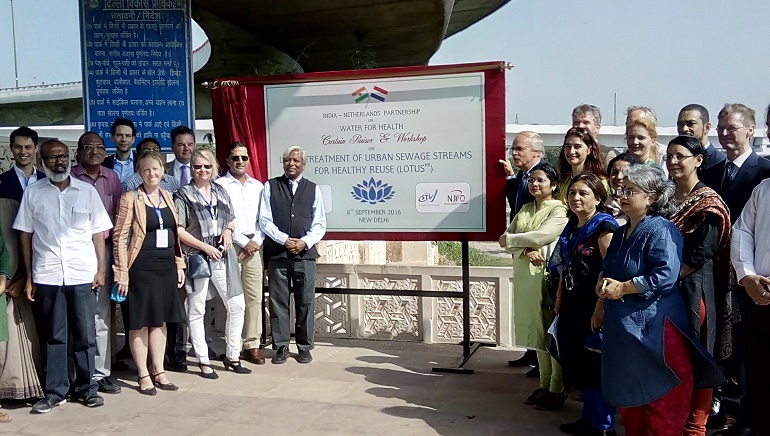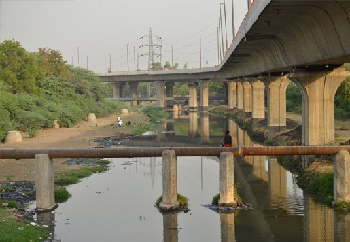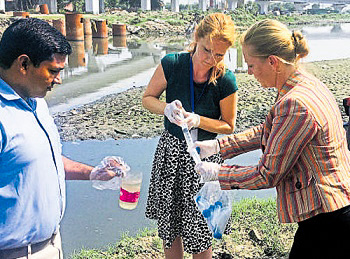Indian-Dutch consortium rolls out cleaning project Barapulla drainage canal, New Delhi, India

A consortium of Indian and Dutch scientists have teamed up to realise a network of wastewater treatment plants that will clean the heavily polluted Barapullah Nullah drainage canal in New Delhi, India. The first step is the construction of a pilot plant to be able to determine the most cost effective technology.
The Indian scientists are from the Indian institute of technology, Delhi (IIT-D), Energy resources institute (TERI), and the Dutch scientists from Delft university of technology, Wageningen university and Vrije Universiteit Amsterdam.
On 8 September scientists from both countries met for the curtain raising ceremony (top photo) at the Barapullah Nullah, marking the roll-out of the Dutch-Indian cooperation.
 Domestic and industrial pollution
Domestic and industrial pollution
Barapullah Nullah is a 12.5 km-long drainage canal in India’s national capital New Delhi. It collects domestic sewage and chemical pollutants from small industry.
The canal is responsible for about 30 percent of pollution in the Yamuna river that flows through the city.
Five years
Restoration of the canal by treatment of waste water can provide a green lung to the heavily polluted national capital.
The project is expected to reach full treatment capacity within five years, cleaning up to a million litres of toxic waste water a day.
In addition the treatment generates biogas and the water can be re-used in agriculture.
 On the occasion of the curtain raising water samples were taken.
On the occasion of the curtain raising water samples were taken.
Pilot plant
To gain practical experience, a pilot plant will be built for finding the most cost effective solution, using local resources and adapting state-of-the-art Dutch water treatment technology to Indian circumstances.
From the early start, industry and end users have been involved in the project, including New Delhi municipal, Dutch companies Shell, Hydrorock, Berson, IPStar, Nijhuis and Indian company InNow.
Memorandum of Understanding
The Indian-Dutch cooperation on the waste water treatment project was one of the items of the Memorandum of Understanding that was signed between the government of the regional state Uttar Pradesh and the Dutch government on 14 July.
This MoU included Dutch assistance in management of waste water, solid waste, urban development, agriculture and transport.
This news item is based on an original publication on the website of the Department of biotechnology of the Indian government.
More information
Netherlands embassy
New Delhi, India
+91 011 24 19 76 00
www.india.nlembassy.org
Delft university of technology
Sanitary Engineering
Delft, the Netherlands
www.citg.tudelft.nl/sanitary-engineering



